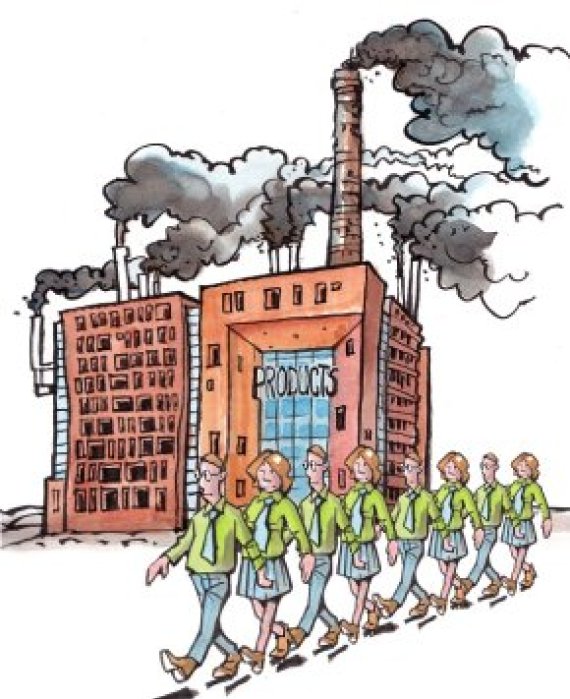Susan de Jong,
Sixth-year Spatial Planning I disagree with the proposition. In everything it does, the university exudes a corporate culture. That’s something you notice as a student. You only have to look at the way in which the WUR profiles itself: as an institute that everyone is keen to do business with. Research and knowledge are the products. The WUR does this more so than other universities. This isn’t necessarily negative. I like that my university has a strong image. But measures such as the ‘hard cut-off rule’ and BSA are also a consequence of the commercial mentality and I’m less happy with that aspect.
Moira de Klijn,
Chairperson of Critical Students Wageningen Doubts about the university’s independence are often expressed in the media, with reference being made to a conflict of interests. That funding comes from industry is a logical step, but it does require transparency about the industrial connections involved. Moreover, there also needs to be funding for fundamental research that is not driven by commercial interests, but which benefits society. The same applies to the education provided: are we solely preparing people for trade and industry or is there also space ‘to open your mind’ and to learn to look critically at society? In my view, safeguarding both would seem vitally important to the university, the students, society and trade and industry.
Oberon Berlage,
Fourth-year Food Technology The university is a factory that houses the ‘education’ machine, with lecturers and students at the controls. Together with the machine, they make the products knowledge, expertise and personal development. As a student you pay roughly 9 euros a day in tuition fees and you are allowed to take the product home with you. While the value of that product cannot be expressed in euros, it will certainly generate profit. The management team must ensure optimal production: a lot gained with little input. And that’s being achieved pretty well in Wageningen.
Tiny van Boekel,
Education Institute director We work with tax-payers’ money and society requires that we use it well. Both the students and the university benefit from ‘studiable’ programmes that provide the opportunity to derive as much as possible in a limited amount of time. This can be achieved by amending the timetabling of courses students find difficult so that the lesson sequence is more logical or by reviewing the teaching methods. You can also make the course material less difficult, but that isn’t an option we’d consider. Sometimes difficult choices must be made, like ceasing to offer a smallscale programme to make more money available for programmes that are in demand. Evidently, in Amsterdam the choice was not made in good consultation with staff and students. In Wageningen, by contrast, participation is well-organized. For example, discussion about the future of the communication programme is still ongoing. If this were a company, the programme would have already been halted, whereas we prefer to keep on trying to make a go of it.
Karel Brasser
VeSte, party member If the university can work more efficiently by becoming more businesslike, that’s a good thing, provided it doesn’t compromise the quality of education and research. For example, you shouldn’t lower the level of the exams so that more students can graduate quickly. In any event, the focus must not be graduating as quickly as possible, but on graduating as well as possible. Quality comes first. The job of universities is to educate people well, not only so that they have job opportunities in the short-term, but also so they can play a constructive role in society over the long term.
Romy Appelman,
Former Student Council member Wageningen University is the Netherlands’ most successful education business. Nowhere do students stick to the rules as much as they do here. The quality of the education is good and the understanding between the Executive Board and the Student Council is also good. No Amsterdam- style problems here then. But this efficiency does have a flip side. If the highest aim is that students gain their degree within five years, is any room left for a student council, student union or university magazine with a critical attitude towards the university’s policy? And to what extent can students develop in the breadth during those five years?
Illustration: Henk van Ruitenbeek







